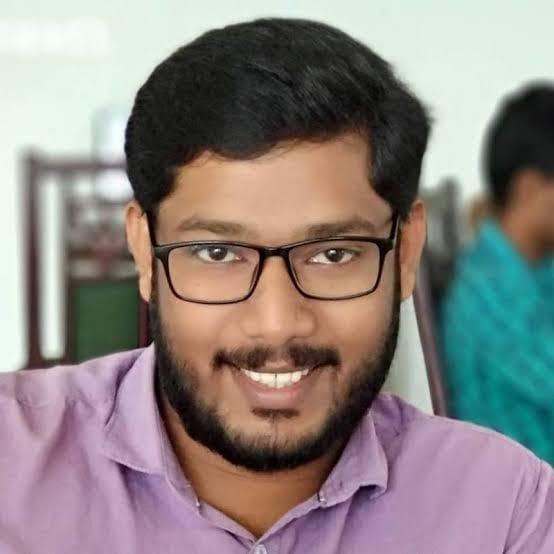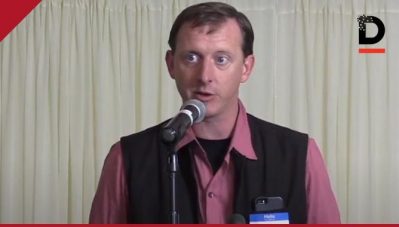
Pieter Friedrich is a South Asian Affairs Analyst. He is the co-author of Captivating the Simple-Hearted: A Struggle for Human Dignity in the Indian Subcontinent. As an author and an activist, he engages with issues such as human rights, supremacist political ideologies, ethnonationalism, authoritarian government structures and policies, state-sponsored atrocities and much more. He has been critical of the Hindu nationalist government in India as well as the RSS elements in the U.S. politics. In this detailed conversation with DoolNews, Pieter Friedrich talks extensively on how authoritarian regimes tighten grip on power amid COVID crisis and how lockdown measures will become the permanent architecture of oppression even after the pandemic crisis eases.
In the name of protecting life, governments around the globe have imposed unprecedented draconian measures that actually destroy lives. Lockdown kills. We see this happening directly in India, where police have beaten people to death for violating the curfew. Lockdown also kills indirectly. It forces millions into unemployment, impoverishes people, and drives them into breadlines. Locking people in their homes lowers their immune systems and makes them vulnerable to disease. We are seeing massive spikes in domestic violence, depression, drug addiction, alcoholism, mental instability, and suicide. This is expected. These new police states not only deprive people of their right to work but of their very humanity. As social creatures, we need human contact not just to thrive but to survive. Yet human interaction has now been criminalized in a huge number of countries. These lockdowns are a violation of our human nature.
Who benefits from this situation? Certainly not the people. Authoritarian leaders are reaping the benefits of the lockdown. In Hong Kong, France, and India, mass street protests were threatening the grip of those same leaders. Lockdown was a godsend for such beleaguered regimes.
It was the perfect situation for opportunistic tyrants. Both China and India, for instance, were facing increasing international pressure over their treatment of protestors. In the US, a movement to pass city-level resolutions condemning the Citizenship Amendment Act and National Register of Citizens was gaining momentum. People were widely comparing the laws to a saffronized version of the Nuremberg Laws — the legislation in Nazi Germany that stripped Jews of citizenship rights. Modi was facing mounting pressure both within and without India. Then his regime was able to position itself as caring and concerned with the preservation of human life. In the name of fighting an invisible enemy, it was able to get away with doing what it probably wanted to do years ago: lock down the entire country.

These lockdowns are a violation of our human nature.
When a regime that is already accused of totalitarian tendencies and violence against minorities or dissidents imposes a lockdown in the name of protecting public health, the rational response is extreme scepticism.
As George Orwell said, “We know that no one ever seizes power with the intention of relinquishing it.” The totalitarian powers that have been grabbed by governments around the world in the name of protecting public health are powers that many of those governments have long sought to wield in ‘normal’ times. In the US, for instance, the National Security Agency launched mass surveillance systems in the name of fighting terrorism. Current efforts in America to hire hundreds of thousands of ‘contact tracers’ to interrogate and monitor the population seem to be just the logical next step to mass digital surveillance.
Government officials at every level — local, state, national — are currently tasting power that no state in the civilized world has ever accessed before. They control what kind of work people can do, where they’re allowed to go, when and why they can leave their homes, what they wear, and even where they physically stand while in public. It is totalitarianism. It is said that power corrupts and absolute power corrupts absolutely. This new level of pure totalitarian power was achieved overnight, it is intoxicating, and those who are drunk on it will only ever want more. Isn’t that the nature of addiction?
Aside from the addictive nature of totalitarian power, consider that many of these newly empowered states are controlled by people with strong ideological incentives to keep that power.

On 24 March, with just four hours’ notice, India’s prime minister announced that no one could leave home for 21 days and it was extended several times.
Look at my native state of California, for instance. Governor Gavin Newsom openly said that he sees this crisis as an “opportunity for reimagining a progressive era” and “an opportunity to reshape the way we do business and how we govern.” Even as a left-wing politician, he has no shame in taking political advantage of a public health crisis to advance his personal political agenda. Thus, he is one of the few governors in the US who imposed an indefinite lockdown with no set endpoint.
In France, the right-wing Emmanuel Macron has faced sustained street protests by the Yellow Vest Movement since 2018. In early 2020, he faced the longest mass strike in French history over his pension reform proposals. In late February, when attention shifted to the COVID-19 crisis, Macron pushed through his reforms by decree. Within two weeks, his government banned mass gatherings, shuttered all “non-essential” businesses, and imposed a lockdown. Thus, in the name of public health, he crushed dissent.
In Hungary, the right-wing Viktor Orban was handed dictatorial powers during the state of emergency. That’s bad enough, but he also managed to make the emergency declaration indefinite. The declaration included severe criminal penalties for anyone spreading “misinformation” — which gives Orban the potential power to jail critics of his policies.
Of course, in India, we have seen the Modi regime systematically targeting its critics. Anand Teltumbde is among the most notable examples. “The message is loud and clear to all others: to not speak against the government,” he has said about the witch-hunt against him. Masses of common people are also being silenced in less high-profile cases. There are constant arrests of people for social media posts “insulting” Modi, Yogi Adityanath, or even the RSS.

Pieter Friedrich’s book: Captivating the Simple-Hearted: A Struggle for Human Dignity in the Indian Subcontinent
The RSS/BJP’s vision is a regimented society where everyone is the same religion, speaks the same language, and exists for no other purpose than to serve the Hindu Rashtra. That requires control of the state machinery, mass surveillance, and ruthless policing. Lockdown gave them all of that. They certainly won’t be eager to give up those powers and return to a free society. Why else do we keep hearing these ominous warnings about a “new normal” where nothing will ever be the same anything?
‘New Normal’ is the code for a permanent totalitarian system.
Forcing citizens to install a particular app on their personal phones is nothing less than the commandeering of their private property. Doing so is based on the tyrannical idea that the people are actually owned by the State. It perpetuates the society of “invasive and all-pervasive external controls” about which Dr. B. R. Ambedkar warned. “When every man is forced to accept in his life, both generationally as well as on a day-to-day level, the purposes of others, the proper government of oneself as an individual seems entirely pointless,” said Ambedkar. When people don’t even have a choice over what apps are on their mobile phones, they have — in principle — been stripped of all ability to self-govern their own lives. Mandating that people use an app degrades individuals to the level of possessions of the State.

Aarogya Setu crossed five million downloads within three days of its launch, making it one of the most popular government apps in India.
There is no end to the concerns over how such a program can and will be abused. We have already seen in Kashmir how the government, after snapping mobile internet services for months, restored a restricted version where people can only access certain “state-approved” websites. If Kashmiris are already forbidden from making their own choices about what they want to read, hear, or watch on the internet, how can we expect Indians to be treated when Aarogya Setu is shoved on them?
How will mandated use of Aarogya Setu be enforced? Indians already require a pass simply to step out and buy milk. Reports say that not just private/public employees, but everyone in COVID-19 containment areas must download the app. Will the police be sent door-to-door to examine people’s phones to ensure they are using the app? Being compelled to show your phone to prove it contains a particular app destroys the concept that the authorities need the warrant to search your property.
Aarogya Setu does not raise the risk that the State might conduct mass surveillance because it is, by its very nature, intended for mass surveillance. The Modi regime has made it crystal clear that its goal is to crush dissent. An app that allows the State to track every movement of an individual — and, almost certainly, obtain backdoor access to surveil the content of that individual’s phone and monitor their conversations — will undoubtedly be used for devious purposes. It does not matter what the excuse is for mandating the use of the app. Aarogya Setu is being imposed on the citizenry in the name of public health merely because no tyrant wants to let a good crisis go to waste.
Many people seem to have forgotten that the regime which imposed a nationwide lockdown in March is the same one that staged an anti-Muslim pogrom in the nation’s capital city in February. The lockdown did not occur in a vacuum. Events of the last six months — and the last five years — have not stopped shaping current events simply because there is now a public health crisis. Those shouting “shoot the traitors” in January did not suddenly become soft-hearted guardians of the public good because COVID-19 began spreading.
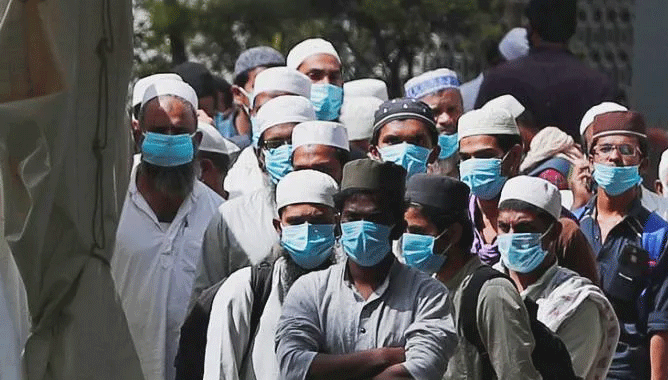
Right-wing groups were spewing communal hatred that the members of the Muslim sect Tablighi Jamaat have been spreading the virus intentionally as a part of their ‘Corona Jihad’.
As Amit Shah said in 2019, they can make any message go viral, “whether sweet or sour, true or fake.” Fake news designed to demonize minority communities has been part of the BJP/RSS’s larger plan for years. The Sangh’s ultimate goal is eradication or assimilation of all non-Hindu communities. Its view of Christians and Muslims, in particular, was illustrated by RSS guru M. S. Golwalkar, who called them “foreigners” and even “traitors.” Today, the Sangh uses even more dehumanizing terminology. For example, Shah has repeatedly referred to Muslim migrants as “termites.” Just last year, Adityanath campaigned by calling Muslims a “green virus.”
Dehumanizing rhetoric has always been used by xenophobic elements to whip up a frenzy of hatred against the “other.” In the 1990s in Rwanda, the Tutsis were called “cockroaches” who had “infiltrated” society. In Nazi Germany, the Jews were called “vermin.” The infamous Nazi propaganda film, “The Eternal Jew,” compared Jews to “rats” and accused them of spreading “disease, plague, leprosy, typhoid fever, cholera, dysentery, and so on.”
Just as the current crisis provides opportunistic tyrants with a chance to grab more and more power, it also provides opportunistic supremacists with a chance to spread fear of those it hates.
Around the world, people are being labelled as either ‘essential’ or ‘non-essential.’ It is directly reminiscent of when the Nazis once considered people as ‘Aryan’ versus ‘non-Aryan.’ It is the most anti-human concept, a direct and unashamed attack on the universal equality of all humanity, and a concept that feeds directly into the agendas of supremacist forces.

The social conditioning fed to the public serves the purpose of breaking down all dissent. Legally, gatherings are banned and thus protests are outlawed. Psychologically, people are persuaded that human touch itself is potentially lethal. A handshake, a pat on the shoulder, a hug, a kiss — every method of demonstrating affection is now portrayed as deadly.
While physical distancing and intensive hygiene are crucial to stopping the spread of disease, authoritarian governments benefit from the terror of human interaction that the need for these things can create in people. If people — especially strangers — are afraid to assemble, sit together, and eat together, then they will certainly never educate, agitate, or organize.
This does not seem to be an exclusively right versus left issue. Sweden’s left-wing government never imposed a lockdown but California’s left-wing government did. Brazil’s right-wing government never imposed a lockdown but India’s right-wing government did. What seems likely, however, is that the fallout from these lockdowns will make a much larger segment of the population susceptible to being radicalized in either direction — as well as open to tolerating radical groups.
Unemployment is at catastrophic levels. Panicked people are being encouraged to spy on their neighbours and report them to the authorities. Totalitarian measures are being not only accepted but welcomed by much of the public. Millions who once made their living through honest hard work are now forced into dependency on the State.

Migrant workers of India walk home as the govt declared lockdown.
In India, where social safety nets are not so strong, agenda-driven third parties have stepped in to fill some of the gaps. The RSS, in particular, has seized the chance to exercise quasi-governmental powers by providing “essential” services. We have seen the RSS staffing police checkpoints, partnering with municipalities to conduct door-to-door screenings, and distributing food.
All of this helps “normalize” the paramilitary as well as increase the citizenry’s dependency on it. The BJP was already merely a front for the RSS, but this current crisis appears to be empowering the group to openly assume — or supplement — governmental duties.
Within India, the current crisis has certainly enabled the right-wing RSS to tighten its grip over society.
More than anything else, the current crisis has exposed the failure of centralized government and the desperate need for localization. Certainly, there is a problem of a government possessing too much power. No government should possess totalitarian power. Yet the local tyrant is vastly preferable to the one ruling from afar. Local elected officials are more likely to know what the people need, more responsive to the people’s demands, and easier to hold accountable for their actions.
In the US, most COVID-19 cases are isolated to a few major metropolitan areas like New York City and Los Angeles. Although urban areas are at greatest risk, the rural areas in which 20 percent of the population live are subject to the same draconian restrictions. State governors with centralized powers have imposed a “one size fits all” solution.

In the US, most COVID-19 cases are isolated to a few major metropolitan areas like New York City and Los Angeles.
Look at California’s Placer County, for instance, where my family lives. The county has a population of 400,000 people. It has had eight COVID-19 related deaths. As local officials there point out, the county has two COVID-19 deaths per 100,000 residents — but because of the lockdown, it has lost 7,000 jobs per 100,000 residents.
If power were decentralized and local officials had the authority to examine the ground realities and make their own decisions, huge sections of the US would be open right now. There would be no lockdown. In Placer County, for instance, officials are now saying that there is no pandemic in their county. There is not even a public health crisis. The problem is that centralized power prevents them from taking local action to restore a free society.
Autocratic regimes are the real cause of the crisis. They are attempting to break the fundamental nature of humanity. They are breeding distrust among the populace and creating an “us” versus “them” mentality. Even many democratic regimes are now operating as de facto dictatorships, paving the way for mass human suffering in the future. Never forget that whatever powers are entrusted with a good-intentioned dictator today can easily be transferred into the hands of a malicious dictator tomorrow.
In the specific case of Modi, look at how he turned a potential public health crisis into a guaranteed economic crisis.
How many of those polled are migrants and day labourers? How many auto-rickshaw drivers, street vendors, maids, cooks, and so on were polled? How many are among the 122 million who have lost jobs due to the lockdown? How many were from India’s 14 percent Muslim population who have been demonized, marginalized, and slaughtered by the RSS/BJP? Were the families of those beaten to death by police for violating the lockdown also polled?

Such polls are highly suspect. How many people from each state were polled? What was their socio-economic status? What was done to ensure citizens without access to landlines or mobiles were also polled? This is reminiscent of elections where candidates receive 90 percent of the vote — which is an almost guaranteed sign that the election was rigged.
Whatever the case, the nature of reality is not dictated by popular vote.
Has Modi ever actually been to India? His announcement of the lockdown made it appear as though he is the prime minister of a completely different country. It is one thing to announce a lockdown in a relatively wealthy country with a large suburban population. It is another thing entirely to announce a lockdown mere hours before it goes into force in a country where around two-thirds of the population lives in poverty, tens of millions live on the streets, and hundreds of millions are internal migrants.
How did Modi account for the beggars who survive by wandering traffic in the streets of Delhi? How did Modi account for the legless, blind, or mentally disabled who wander the train stations, religious sites, and markets? How did Modi account for the chai wallas who make their living selling tea on trains?
Modi’s handling of the situation ought to be viewed as either the strategy of a madman or that of a tyrant. Either way, the conclusion is the same: he is indifferent to the impact his policies have on human life.
Lockdowns around the world have brought a suspension of almost every basic human right. Freedom of assembly, freedom of religion, freedom from unreasonable search and seizure, freedom to work, even freedom of speech (in some cases) have all been suspended in the name of public health. This sets a terrifying precedent. If our fundamental human rights are considered ‘non-essential’ in this current crisis, then at what other times can they also be suspended? This era will go down in history as the greatest assault on our civil liberties.
Lockdown also offers the perfect opportunity for regimes like Modi’s to operate behind an iron curtain. In the shadows, in secrecy, and without fear of pushback. Now, at a time when protests are banned, is exactly when a tyrant can act with impunity to remove dissidents from society. The arrests of people like Safoora Zargar and Anand Teltumbde illustrate the Modi regime’s priorities during this crisis. The regime wants to crush dissent.

Safoora Zargar of the Jami Coordination Committee.
Of course, civil liberties were already at great risk in India. It was a fragile situation for freedom. It is a tragic irony that Safoora was arrested by the anti-terror cell of the Delhi police due to her involvement in anti-CAA protests even though it is that very same police force which is accused of collaborating with mobs to stage the Delhi Pogrom — meaning that they themselves were engaged in state terrorism.
Look also at how Manish Sirohi, who is suspected of supplying guns to the rioters during the Delhi Pogrom, was released on bail in early May. Safoora and Manish were both arrested on the same charge. Yet the pregnant Safoora remains behind bars while Manish was granted bail due to the risk of contracting COVID-19 in custody.
Modi’s regime is using the public health crisis as an excuse to lock away those it doesn’t like and release those it does like. This is not about saving lives. It is about totalitarian control.
On a hopeful note, a protest demanding release of Teltumbde just took place in Mysuru. The protest was apparently in violation of the lockdown. That kind of nonviolent civil disobedience in support of our fundamental human rights is exactly what people all around the world should be doing right now.
The year 2020 will mark the launch of the next global battle for civil rights.
During the Modi regime’s attempt to crush anti-CAA/NRC protests in early 2020, people were saying that all of India has become like Kashmir. By March 2020, there were indications that Kashmir might finally emerge from lockdown — at least, in some ways — after seven months of being a nearly complete black zone. The global COVID-19 scare, however, gave Modi’s regime a handy excuse to once again plunge Kashmir into full lockdown.

“Excuse” is the operative term. Out of a population of 12.5 million, there are currently only eleven (as of this writing) COVID-19 related deaths in Jammu and Kashmir. By that metric, there is not a public health crisis in J&K — not even remotely. Now, however, in the name of public health, the new lockdown in Kashmir has become even more stringent than the one imposed after the August 2019 annexation. At least mosques, shops, and markets were beginning to reopen over the past few months.
What is going on in Kashmir today? No one knows. The only information we have comes from government sources. In February, I joined others who were sounding the alarm about the looming threat of genocide. We know what happened — openly, often on camera, and with the backing of the BJP and the local police — in Delhi.
Yet we still don’t know what happened to many of the thousands of Kashmiris who were arrested and being held indefinitely after the scrapping of Article 370. Today, behind the iron curtain of the lockdown, absolutely anything and everything could be happening.
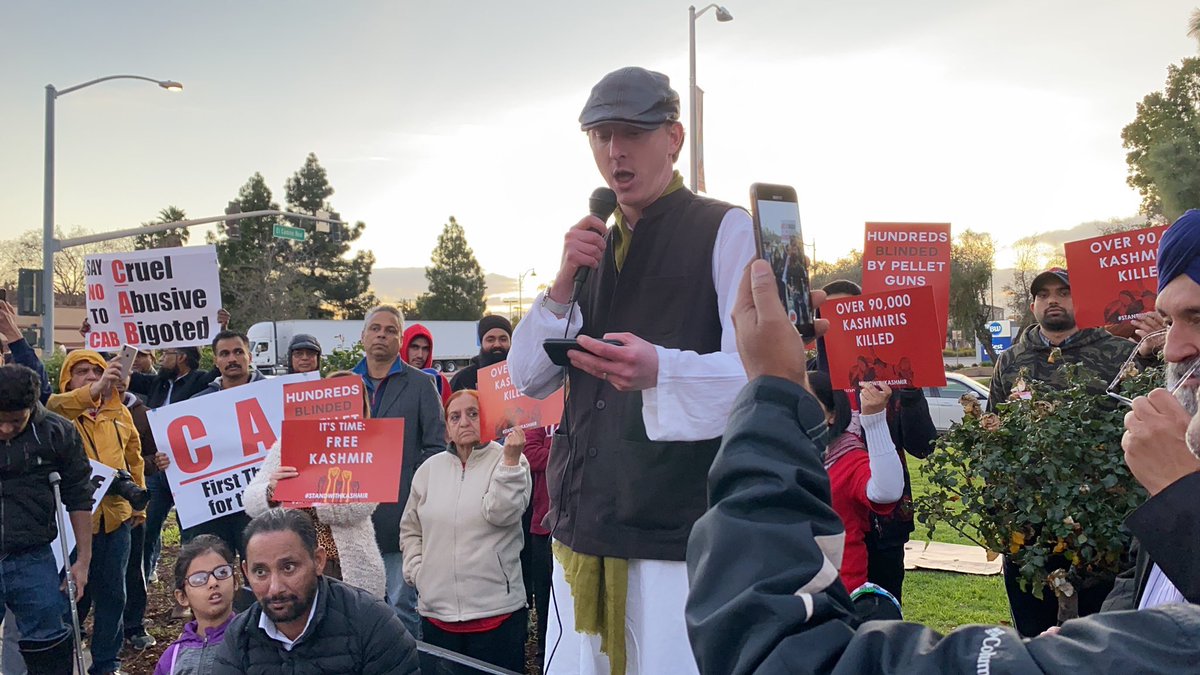
Pieter Friedrich addressing a Kashmir solidarity gathering.
How many more Kashmiris have been imprisoned? How many have been snuffed out in fake encounters? The only way to find out what is happening in Kashmir is for the lockdown to end — not just in the north, but in all of India
As president, Trump has the largest platform in America. He has the “bully pulpit.” His domestic power is limited, however, by the fact that the US is a federal system. The president does not have the power to impose a national lockdown. Every lockdown in the US has been imposed by the governors at the state level — and they are the only ones who can lift those lockdowns.
Across the country, millions of dollars have been wasted on setting up surge tents at hospitals and deploying military hospital ships that were never used. People are being arrested for using public parks, walking on the beach, and organizing anti-lockdown protests. In New York City, over 80 percent of those cited for violating the lockdown are African-American or Latino.

The most brutal incidents of police caught on camera while enforcing lockdown involve them beating minorities. At the end of 2019, unemployment was at an all-time low; today, it is the highest it has been in 100 years. Owners of “non-essential” businesses who open are arrested and accused of being “selfish” for operating, to which they reply: “Feeding my kids is not selfish.” Those suffering financially are not government workers or Wall Street employees but people earning less than $40,000 per year (in a country where the median annual income is $63,000).
The state governors in America are the ones who have the power to act on this issue. Why are so many of them refusing to take this data into account? Where is their compassion for the minorities, the low-income, the everyday people who are being driven into poverty by lockdown?
As the man with the loudest microphone in the country, Trump is certainly responsible for failing to speak on these issues.
Bernie Sanders offered a glimmer of hope for a renewed US-India relationship that would have been premised on dialogue about human rights and civil liberties. He offered a vision of society that placed people over profits. However, the establishment in the Democratic Party hated him and, many of his supporters believe, worked to sabotage his success.
Instead, the 2020 presidential race will be between Joe Biden and Donald Trump. Both are suspected of senility and both are accused in multiple sexual harassment cases. Most importantly, neither one offers any substantial change to the one consistent policy of America’s federal government: empire. Both Biden and Trump continue to view America as the world police. Neither one is likely to do anything to end the illegal foreign wars in which the US has been entangled for decades. Yet none of the other pressing issues in America — race relations, economic inequality, access to healthcare — can be solved as long as the American Empire remains in place.
It’s impossible to say which candidate would be better for the US-India relationship in regards to human rights. Trump has aligned closely with Modi over the past year, appearing with him at mega events in both the US and India. Biden, however, has Amit Jani (the son of the Overseas Friends of the BJP co-founder) as a senior staffer on his campaign. He is also closely aligned with Congressmen Ami Bera and Raja Krishnamoorthi. Bera has been a strong advocate for Modi while Krishnamoorthi has keynoted RSS events in America.
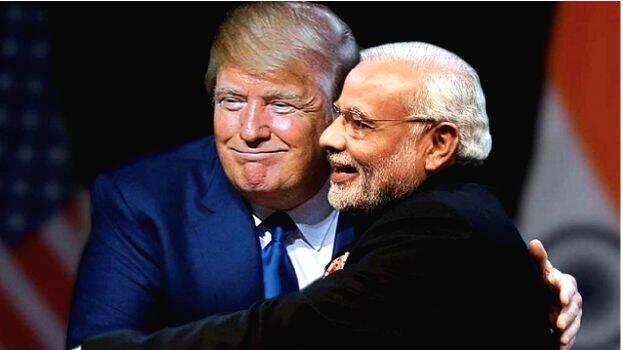
Now more than ever, people around the world need to embrace the reality that we are all born free. Our rights do not come from the government. In the US, for instance, the Constitution guarantees protection of certain individual rights, yet we do not possess those rights because they are in the Constitution but simply because we are human.
Just as tyrants have seized on this crisis as an opportunity to grab power and advance their agendas, we must seize on this crisis as an opportunity to exercise our freedom and encourage our fellow human beings to do the same. We also desperately need to harness the creative energies of humanity to identify better solutions to a public health crisis. After all, our human race only thrives and flourishes when we have Azadi.
